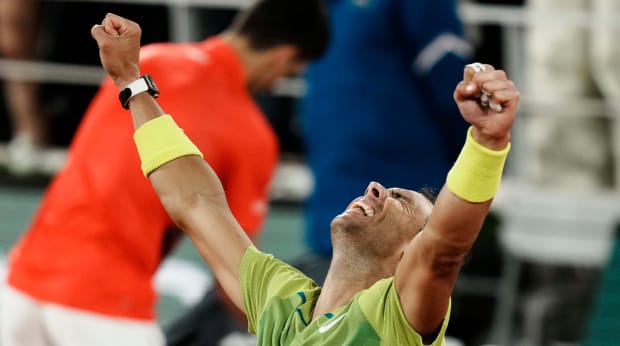Chris Almeida: So we’ve just been through what, for a long time, felt like a replay of last year’s French Open match between Djokovic and Nadal. That one was also a four setter, also incredibly long, lasting over four hours, also had a lot of long, drag-out knock-down rallies. A lot of very long games. But this time, it seems like Nadal had all the answers. Last year, he was physically fading at the end of the match and this time, despite a bad injury to his foot, he looked great and pulled out a four-set win: 6-2, 4-6, 6-2, 7-6 (7-4).
Jon Wertheim: This is part of the beauty of the rivalry. It can all be Magic 8 Ball signs. We’re looking to favor Djokovic, he hasn’t lost in 22 straight sets. It was thought he would have a much easier time here. He didn’t have the foot injuries, he was rounding into form, he got a night match. And then we got exactly the opposite of what most people predicted which is: Nadal got off to the fast start.
Now, in 51 of the 59 matches the player who won the first set won the match. Djokovic looked to be the one who was a little confused and a little uncomfortable. And he honestly was lucky to win the set that he did win. Nadal had a double break to start that second set.
And in some ways, it was a mystifying performance for the defending champion. Given that everything was breaking Djokovic’s way [heading into the match]—Nadal had a long fourth-round match, and is a year older, and was playing in Djokovic’s favored conditions, and Djokovic got him the last time they played here—I was surprised that he didn’t have a bit more energy and a few more answers. And some of this is a testament to their rivalry. I do think the crowd may have gotten in Djokovic’s head a little bit. It wasn’t quite Federer-at-Wimbledon level, but they were heavily in Nadal’s corner. And they stayed until the end. And nobody will be surprised that Rafael Nadal wins a match at the French Open, but I think in a weird way, this was a little bit of an upset.

AP Photo/Thibault Camus
CA: Certainly. When anybody asked me who I thought was going to win this tournament, I said … it was Djokovic. Right? He was in great form coming in and he was healthy. And so I think that the big difference right between the two situations that you mentioned— playing Federer on Centre Court and playing Nadal here on Chatrier— is that I think that Nadal does not get tight in moments like this. You know very much see Federer feeling the weight of the match points even as he serves for them. And here, you know Nadal is going to fight back even if he is in conditions that are against him and here, nothing was against him. The crowd is backing him up. And with a guy like Nadal across the net from you, it’s probably harder for Djokovic to go into the zone and do whatever it is that he does … imagining the fans are actually chanting his name or that whole thing.
JW: Now, keep in mind, too, Nadal played for four-plus hours in the fourth round. So it’s not like he played his first match and everybody said, “yeah, the foot was okay” and then he rested it for two weeks. But he’s gone through a lot of wear and tear and he had a four hour-plus match just to get here. And yet, that foot injury seemed fine. And it was a weird match and it didn’t have a lot of rhythm ... I think Nadal’s masterful at sort of creating these narratives in his head: He told this to me the other day: this could be my last match. I have to pretend that this could be my last match on this great court.
Now, is that true? It probably isn’t, but I think that’s one way he sort of outwitted himself and put him in the headspace where he thinks: The pressure’s on the other guy. I’m happy with what I’ve achieved. And it’s O.K. if I never play again.
On getting nervous, I think that’s a good insight by you. I don’t think Nadal doesn’t get tight, you know, it took him multiple match points and he had a 3–0 lead in the second set that he let slip away. I think he does get tight, but I think it’s in a different way than Federer.
CA: Yeah, of course. Everyone gets tight, but maybe I should say it seems less notable. And here he had enough margin that … five match points is a lot of time to compose yourself.
Anyway! In the next round, Nadal’s got Alexander Zverev, which is maybe not exactly what we were expecting at the start of today. Zverev had a tough match against Alcaraz that he pulled out.
JW: I don’t think Nadal minded that result…
CA: Yeah, I mean, if you want to talk about someone who cracks under pressure… I think that’s big advantage Nadal in the semis. And if the crowd was even a little split today, I think it will be entirely on Nadal’s side in the next round.
JW: I mean, you never know what happens with somebody who’s 36 years old and someone with injury problems like this, but it certainly seems like it’s lining up for him.
It’s funny. Tournaments are supposed to get harder as you go, but for Nadal, he’s now looking at less difficult opponents as he goes on. Zverev is obviously a very nice player and he can move and he can play on clay. He’s beaten Nadal on clay before, but not in a major. I think Nadal is definitely the favorite from here out.







